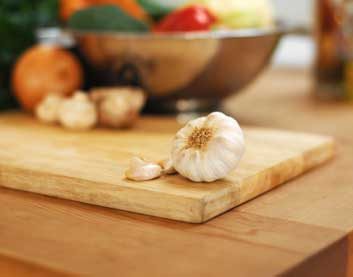
Garlic
“Garlic shows particular evidence that it can decrease the risk of stomach and colorectal cancer,” says Jean LaMantia, registered dietitian and author of The Essential Cancer Treatment and Nutrition Guide Cookbook.
Don’t peel it and eat it right away, though. For maximum benefits, you have to chop it or crush it.
“If you wait 10 minutes after you chop it, you maximize cancer-fighting compounds,” says LaMantia.
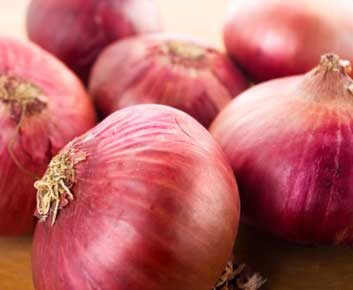
Onion
Like garlic, onions are a member of the allium family, which includes leeks, shallots, and green onions. Onions are a great cancer-fighting food, says LaMantia, because they “interfere with the growth process of tumours.”
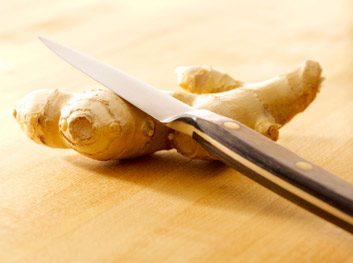
Ginger
Normal cells have a lifespan that ends naturally. Cancer cells, on the other hand, keep multiplying. Luckily, “ginger contains a phytonutrient called 6-gingerol that helps cancer cells end their lifespan,” explains LaMantia. “It also reduces the cell’s ability to create its own blood supply.”
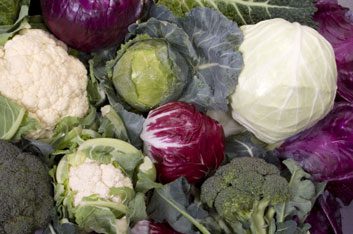
Cruciferous vegetables
Cruciferous vegetables like cauliflower and broccoli may not be the most popular, but they’re incredibly nutritious.
“They contain the largest variety of phytonutrients with anti-cancer activities,” says LaMantia.
Eat more Brussels sprouts, collard greens, kale, watercress, turnip, cabbage and broccoli to get a healthy dose of phytonutrients that help create cancer-fighting compounds.
“Broccoli has a particular type of phytonutrient, and is very strongly anti-cancer,” says LaMantia. “Eat it weekly for the benefits.”
Want to keep the nutrients in your cruciferous veggies? Don’t overcook them. “If you smell that sulfur smell, you’ve cooked it too long,” says LaMantia. “If you overcook it, you’ll lose the nutrients.”
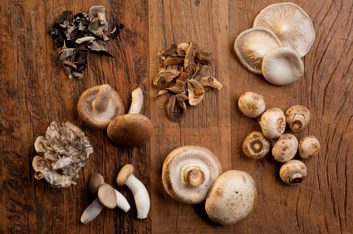
Mushrooms
“Different mushrooms have different beneficial effects, but in general they all contain anti-cancer nutrients,” says LaMantia.
Still, it’s best to try different types of mushrooms, like cremini, portobello and oyster to add different nutrients to your diet.
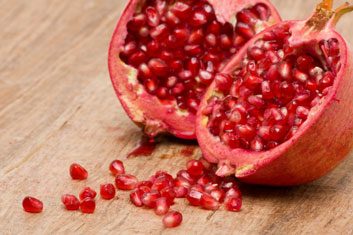
Pomegranate
Not only are pomegranates one of the oldest-known fruits, they have lots of anti-cancer properties.
“They’re anti-inflammatory and contain antioxidants,” says LaMantia. “Plus, they taste great on salads!”
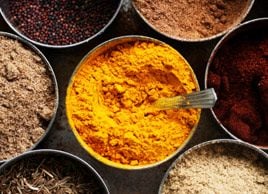
Turmeric
“Turmeric contains an important phytonutrient called curcumin,” says LaMantia. “It can help fight cancer in variety of different ways.”
Not only does it reduce inflammation and stop the invasion of cancer cells, “it can cut off the life cycle of a cancer cell at several different stages,” says LaMantia. That means that it’s never too early-or too late-to add turmeric to your diet.
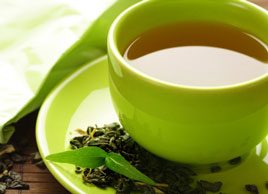
Green tea
“A phytonutrient in green tea shows strong anti-cancer properties,” says LaMantia. “Three cups a day is recommended for optimum benefits.”
While it’s great no matter what, if you want to maximize the cancer-fighting potential, it’s best to boil the water and let it steep for 8 to 10 minutes.

Dark chocolate
Luckily for chocolate lovers, dark chocolate contains polyphenols, which are important for fighting cancer.
“Look for 70 percent cocoa in chocolate. And use natural, dark cocoa in baking,” says LaMantia. A couple of squares a day is the ideal amount.
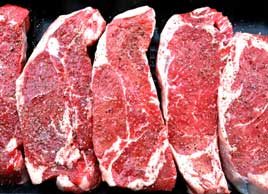
Foods to avoid
While there are many great cancer-fighting foods, there are even more potentially harmful ones.
“Avoid processed meats-that includes processed meat with a “natural” label,” says LaMantia. “They contain celery root extract, which works the same way as the harmful nitrate preservative?
Other things LaMantia recommends limiting are red meat, refined grains, excess sugar and excess alcohol.
She also recommends limiting intake of canned foods containing harmful chemicals like BPA (bisphenol A).
Another thing? “Don’t put hot food in a plastic container, or microwave food in plastic containers.”
Related:
• How to decrease your stomach cancer risk
• 10 foods that fight breast cancer
• The 5 deadliest cancers for women
